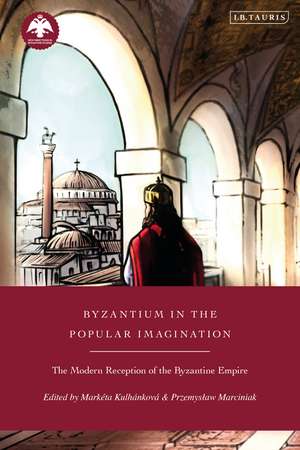Byzantium in the Popular Imagination: The Modern Reception of the Byzantine Empire: New Directions in Byzantine Studies
Editat de Markéta Kulhánková, Przemyslaw Marciniaken Limba Engleză Hardback – 6 sep 2023
Preț: 541.13 lei
Preț vechi: 774.45 lei
-30% Nou
Puncte Express: 812
Preț estimativ în valută:
103.54€ • 108.40$ • 85.68£
103.54€ • 108.40$ • 85.68£
Carte tipărită la comandă
Livrare economică 07-21 aprilie
Livrare express 28 februarie-06 martie pentru 126.64 lei
Preluare comenzi: 021 569.72.76
Specificații
ISBN-13: 9780755607280
ISBN-10: 0755607287
Pagini: 296
Ilustrații: 22 bw illus
Dimensiuni: 156 x 234 x 24 mm
Greutate: 0.59 kg
Editura: Bloomsbury Publishing
Colecția I.B.Tauris
Seria New Directions in Byzantine Studies
Locul publicării:London, United Kingdom
ISBN-10: 0755607287
Pagini: 296
Ilustrații: 22 bw illus
Dimensiuni: 156 x 234 x 24 mm
Greutate: 0.59 kg
Editura: Bloomsbury Publishing
Colecția I.B.Tauris
Seria New Directions in Byzantine Studies
Locul publicării:London, United Kingdom
Caracteristici
Includes case studies on literature, television, video games, political discourse, pedagogy and more
Notă biografică
Markéta Kulhánková is Associate Professor at the Institute of Classics, Masaryk University, Czech Republic.Przemyslaw Marciniak is Professor of Byzantine Literature and Head of Center for Studies on Literature and the Reception of Byzantium, at the University of Silesia, Poland. He is the author of Greek Drama in Byzantine Times (2004), a Polish translation of the satire Timarion, and is the co-editor of The Reception of Byzantium in European Culture since 1500 (2016).
Cuprins
List of FiguresList of ContributorsThe Many Faces of the Reception of Byzantium (Markéta Kulhánková, Masaryk University, Czech Republic, & Przemyslaw Marciniak, University of Silesia, Poland)Part One: Byzantium on Display. Scholarly Debates, Political Uses, Modern ReconstructionismChapter 1: Popularizing Byzantine Architecture -the 1900 Paris World Exhibition, Balkan Nationalisms, and the Byzantine Revival (Fani Gargova, University of Vienna, Austria)Chapter 2: East or West? Byzantine Architecture and the Origins of French Medieval Architecture in the Scholarly Debate, 19th C. (Francesco Lovino, American Academy in Rome, Italy)Chapter 3: Byzantium as a Political Tool (1657-1952). Nations, Colonialism, and Globalism (Ivan Foletti, Masaryk University, Czech Republic, and Adrien Palladino, Masaryk University, Czech Republic)Chapter 4: The Prince and The Greeks. The Byzantine Baptizers of Prince Vladimir in Modern Russian Sculpture, Mosaic and Church Architecture (Roman Shliakhtin, Johannes Gutenberg-Universität Mainz, Germany)Chapter 5: Museum Interpretations of Byzantium (Sofia Mali, University of The Arts London, UK)Part Two: Byzantium & Modern MediaChapter 6: Byzantium in Comics (Lilia Diamantopoulou, Ludwig-Maximilians-University, Germany)Chapter 7: Games of Byzantium. The Image of the Empire in Three Strategy Videogames (Marco Fasolio, University of Eastern Piedmont, Italy)Chapter 8: From History to Propaganda and Back: Byzantium in the Romanian Historical Cinema (Florin Leonte, Palacký University of Olomouc, Czech Republic)Chapter 9: Imagination of Byzantium and the Byzantines in Modern Turkish Popular Literature and Cinema (Buket Kitapçi Bayri, independent)Chapter 10: Byzantium in Greek Cinema (Konstantinos Chryssogelos, University of Patras, Greece)Part Three: Byzantium & LiteratureChapter 11: "Beware of Greeks Bearing Gifts": Byzantium in Czech Historical Fiction (Markéta Kulhánková, Masaryk University, Czech Republic)Chapter 12: Imagining Action: Explanation in Twentieth-Century Historiographical and Fictional Rewritings of the Chronicle of Morea (Matthew Kinloch, University of Oslo, Norway)Chapter 13: The Barbarians Will Always Stay: Rose Macaulay and the Futility of Empire (Olof Heilo, Swedish Research Institute in Istanbul, Turkey)Chapter 14: M. Karagatsis's Byzantinism in his Sergios and Bacchos (1959) (Katerina Liasi, Independent)Chapter 15: Fantastic(al) Byzantium: The Imagery of Byzantium in Speculative Fiction (Przemyslaw Marciniak, University of Silesia, Poland)No Longer a Forgotten Empire? (Przemyslaw Marciniak, University of Silesia, Poland) Afterword: Forging Textual Realities, or How to Write a 'Byzantine Mystery Story' (Panagiotis Agapitos, Johannes Gutenberg University of Mainz, Germany)INDEX




